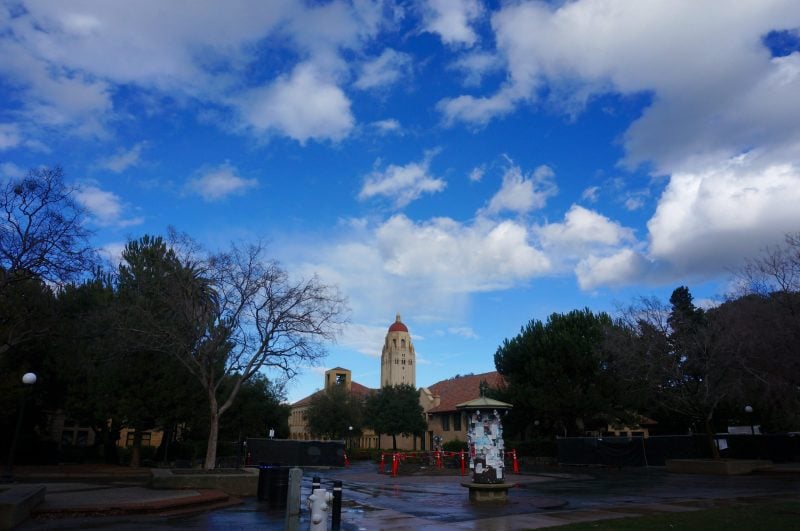A Santa Clara County plan approved in March to stock public restrooms with free period products has led to a resurgence in activism among students and community leaders calling on Stanford to do the same.
They’re making the case that the University has a responsibility to subsidize the basic health needs of Stanford community members. But Stanford has been reluctant to make a definitive decision on the topic following the county’s announcement.
Since Stanford signed its land use agreement with Santa Clara County in 1985, the University has been responsible for funding and operating its own municipal services, meaning that the county is not obligated to provide Stanford with free period products as part of its plan.
While the county does not currently intend to include the University in its distribution, Santa Clara County senior planner Rob Eastwood said he would encourage Stanford to explore potential partnerships with the county on the initiative. Elected county officials are also urging the University to take leadership on the topic of menstrual equity.
“In providing free period products in all our county restrooms, we are modeling best practices,” Santa Clara County supervisor Cindy Chavez, who proposed the plan, wrote in a statement to The Daily. “Everyone should expect sanitary products in a public restroom, whether it be toilet paper, soap or period products. We’re hoping that other institutions take notice and follow our lead.”
One in 10 college students is likely to be affected by the lack of access to menstrual products, according to a study from George Mason University. The same study reports higher rates of depression among these students, who tend to be primarily from communities of color and low-income communities.
“I think it’s definitely an overlooked issue,” said Stanford Planned Parenthood Generation Action president Margot Bellon ’21. “I don’t think we fully realize the extent of the burden that is placed on more socioeconomically disadvantaged college students.”
According to University spokesperson E.J. Miranda, Stanford is currently monitoring how the county’s plan will take effect and has not yet made any University policy changes on period products.
“We appreciate the county’s efforts to expand access to these products and it’s our understanding they are in the process of gathering details of how a plan could be implemented in public facilities in the county,” Miranda wrote. “We look forward to seeing their final decision.”
Though the bill was passed in March, county board members were set to meet again this month to determine the county’s needs and review a proposed budget for the plan. While it is unclear whether this meeting has taken place yet, the law was amended on May 24 to encourage private institutions of higher learning to “stock an adequate supply of menstrual products at no fewer than one designated and accessible central location on each campus.”
Currently, 30 states charge a “tampon tax,” meaning menstrual products are classified as luxury items and non-exempt from taxes. Menstrual products in California are exempt from the luxury tax until January 2022. The average person who menstruates will likely spend 6,000 dollars on period products in their lifetime, according to a study commissioned by period products company Intimina.
Stanford would not be the first sub-county entity within Santa Clara to spearhead its own period product initiative — in 2019, the city of Mountain View started a pilot program after local advocates petitioned the city council. Mountain View plans to move forward with providing free period products in the city’s public buildings this year, and other cities including Menlo Park are considering doing the same, according to Tim Mackenzie Ph.D. ’19, a postdoctoral scholar at the School of Medicine.
Mackenzie, who lives in Mountain View, has been one of the leading voices pushing for menstrual equity in Santa Clara County. Now, as the advocacy coordinator for the Stanford University Postdoctoral Association (SURPAS), he is trying to do the same at Stanford.
“Given Stanford’s extensive resources and position in the world, we believe we should be leaders rather than followers with regards to this topic,” Mackenzie said. “Providing period products doesn’t cost a lot of money. Imagine if every public bathroom you walk into has period products. It seems like a no-brainer, but it doesn’t exist everywhere.”
SURPAS recently passed a resolution urging the University to follow the county’s lead.
But this issue impacts more than just Stanford’s academic community. Paul Regaldo, the president of Service Employees International Union (SEIU) Local 2007, which represents higher education workers at Stanford, SLAC and Santa Clara University, said that the Union is committed to supporting the efforts of SURPAS to ensure that the resolution becomes a reality at Stanford.
“We’re willing to work with the University on this important subject because it affects everybody,” Regaldo said. “Stanford University is one of the most prestigious universities in the world, and that title comes with responsibilities. I think it’s a responsibility that the University does recognize, and once they hear from all of us, I hope they will adopt this.”
Regaldo added that if students take any action or organize any demonstrations, the Union would be more than willing to participate as a sign of solidarity.
